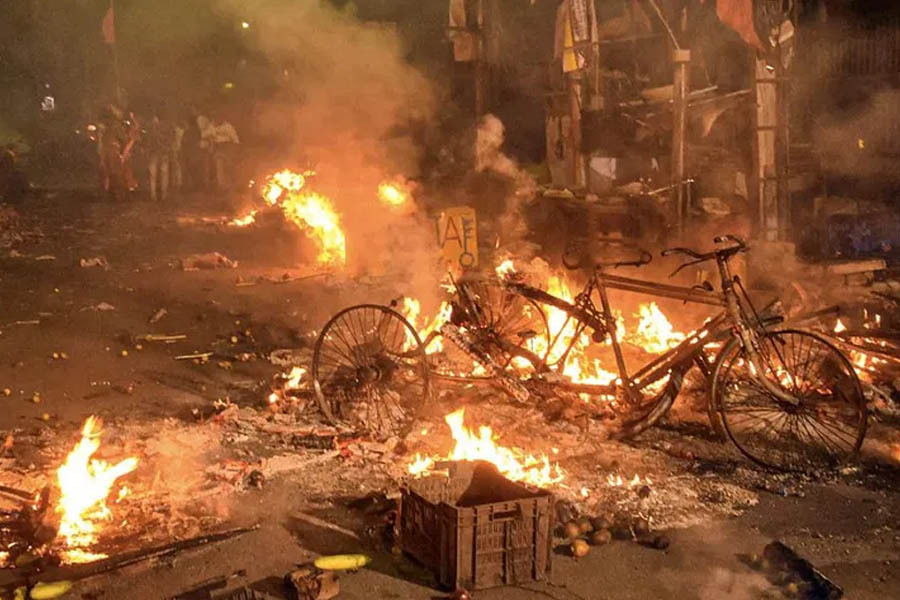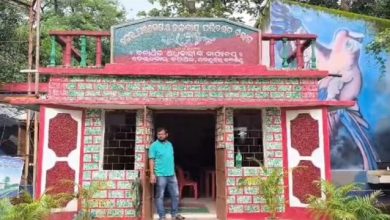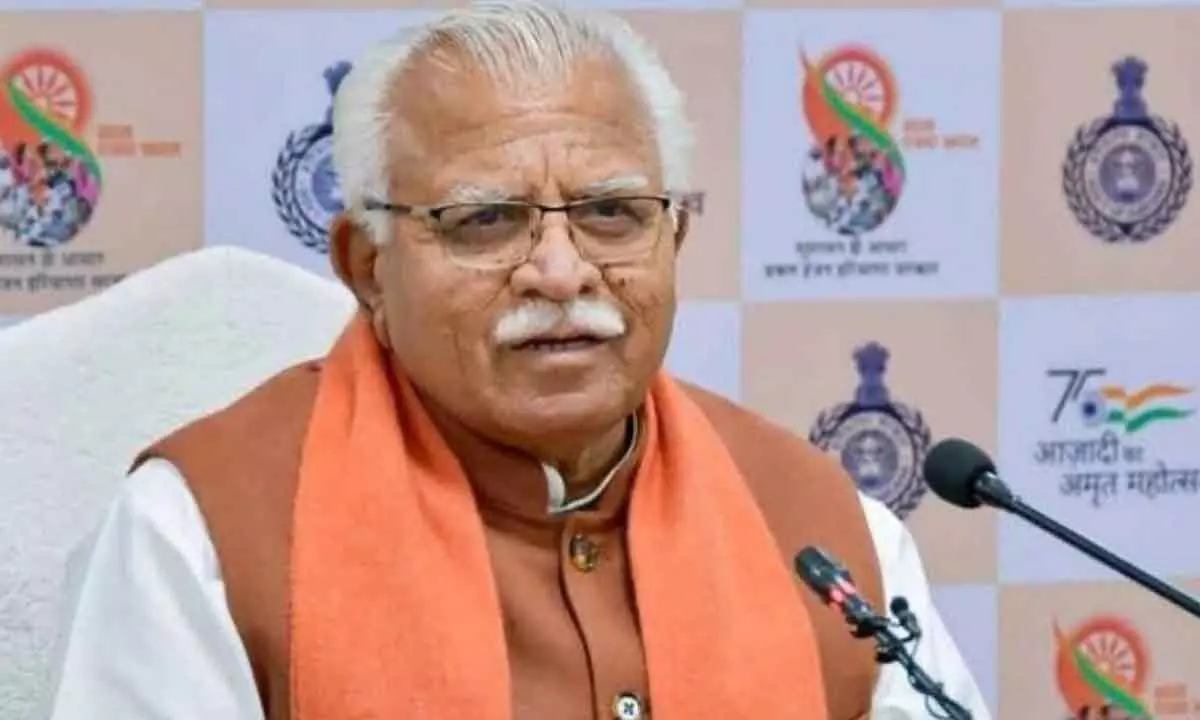Violence is bleak for the future

Seven states in India were witness to clashes between Hindus and Muslims when people were to celebrate the birth of Lord Rama. This came on a Friday in the Holy month of Ramzan when Muslims were to congregate for solemn prayer. In a number of places these skirmishes continued for days. On this day, Hindus are to visit temples, pray, fast and listen to spiritual discourses. Muslims are to be in mosques, thank Allah for bestowing the holy Quran in this month, fast, pray and repent their sins. Instead, we were witness to gory scenes of flashing swords, lathis, stone pelting and helpless police watching in despair or awaiting guidance from their seniors or political masters.
Over the past century and a half, Hindu-Muslim relations in India have been increasingly fraught. Perhaps the last instance of togetherness was the 1857 revolt whose major achievement was that Hindus and Muslims, Brahmins and Dalits forgot their major and minor differences and put up a united fight. It is this unity that made the British rulers indulge in creating differences between these communities. A first step toward this was the census on religious and caste lines, thus starting a competitive spirit among these communities. Hindus became aware of the need to demonstrate larger numbers so as to claim a larger share of resources. The Muslims on the other hand, now encouraged by the British, began using derogatory terms (kafirs) for Hindus. Since the latter did not have a firm definition on Hindu faith, there was constant dispute on this too. The Arya Samajis called themselves Arya and the Sikhs defined themselves as a separate religion. Vast riots in the 1930s and 1940s, a deepening distrust of Muslims among many Hindus and the aggression of the Muslim League culminated in the Partition of India. There has been no looking back since.
However, there have been crests and troughs on communal feelings. We are witness to numerous riots, some of the major ones being 1969 (Gujarat), 1984 anti-Sikh riots, 1989 Kashmir violence, 2002 Gujarat, 2013 Muzaffarnagar and 2020 Delhi. Communal relations remain on edge but peace is restored. State governments and local police are often blamed for inaction or partisan behavior, commissions of enquiry are set up. But experience tells us that little or no action follows. Criminal cases filed more often than not result in acquittals leading to those more affected in losing faith in the state apparatus.
Unfortunately, there has been greater erosion of faith over this past decade. State and societal action is perceived as an attack on Muslims, Christians, and Sikhs. Cries of anti-hijab campaigns, a discriminatory Citizenship Amendment Act 2019 that makes Indian citizenship unavailable to Muslims from neighboring countries, campaigns against so-called love jihad, bulldozer campaigns largely against Muslim homes or business establishments, curtailment on freedom of expression of writers, journalists, police action on universities that have a Muslim name (Aligarh Muslim University, Jamia Millia Islamia) or with Left/secular credentials, denial of tenancies to Muslims, attacks on churches, identifying Sikhs as Khalistanis during the farmers agitations, and apparent partisan behavior of police during disturbances have all given a sense of immense insecurity among minorities, particularly among Muslims and Christians.
Reform needed
Muslim behavior has fared no better. Reactions among a section calling for beheading Hindus post the Nupur Sharma remarks (on the family of the Prophet), attacks on innocent Hindus, even attacks on Ram Navami processions demonstrate hardening of positions. This leads to the grouse among Hindus — that while liberals (and Muslims) are critical of the actions of the State and Hindus, there are few voices that speak about Muslim behavior. Leaders of Hindu organisations speak about this apparent contradiction.
If the larger responsibility rests with Hindus, Muslims too cannot be absolved of their responsibility. It is indeed time for Muslims to look for reform in some customs as indeed Islamic jurisprudence. The largest Muslim organisation in the world, Indonesia’s Nahdlatul Ulama have enunciated this clearly in a major conference held in Surabaya this year. The conference resolved that “archaic concepts of an Islamic Caliphate, concepts of a nation state and justifications for theology and violence have led to universal Islamophobia. The idea of uniting Muslims throughout the world in opposition to non-Muslims as recently demonstrated by the Islamic state ISIS in Iraq, Syria are disastrous and contrary to the purposes of Sharia law ie the protection of religion, human life, sound reasoning, family and property. This therefore puts responsibility on Muslim leaders to look afresh at reforming Islamic jurisprudence, to embrace a new vision, and develop a new discourse to prevent political weaponisation of identity, curtail communal hatred and promote solidarity”.
Start learning the lessons
Spiritual leaders in India like Swami Dayananda Saraswati, Ramakrishna Paramhansa, and Swami Vivekanada spoke of the universality of Hindu philosophy. Speaking at the Parliament of the World’s Religions in 1893, Vivekanada spoke of the different streams having their source in different paths, “which men take through different tendencies, various though they appear, crooked or straight” that all lead to God. Likewise, the message of the Gita is clear: “whosoever comes to me, through whatsoever form, I reach him, all men are struggling through paths which in the end lead to me.”
Vivekananda, in forceful words, criticised sectarianism, bigotry, and its horrible descendant—fanaticism — “that filled this earth with violence and drenched it with human blood, destroyed civilizations and sent whole nations into despair”.
Unfortunately, India that has paid with blood over decades seems to have learnt few lessons. Communalism led to the division of the country. It paid with Gandhiji’s life. It has paid with thousands of human lives and massive losses in properties even since Partition. The nation of Buddha, Mahavir, Nanak, Bulleh Shah and Kabir has forgotten their message of love and harmony at the altar of petty political gains and lack of basic understanding of its own religious ethos. The senior clergy of all religions acquiesce to acts of violence or stay silent. Senior most politicians in India stay silent or mumble words of peace that rarely carry weight. The aim is clear — polarise the country for political power. Coming to power in India is so expensive, so exhaustive and so difficult that any government in power will bend its back to stay in power. Good governance, sound economic principles, societal relations are all given a good bye by governments that India has seen in the past many decades. Therefore, the future is stark. Gandhiji gave Indians the slogan ‘karo ya maro’.
The choice is the same today. We choose peaceful coexistence, better understanding of each other and look to progress or opt for a gradual destruction of not just our ancient values but of all existing systems as well.
Najeeb Jung is a former civil servant, former Vice Chancellor Jamia Millia Islamia, and Former Lt. Governor, Delhi. Views are personal.
SOURCE: THEPRINT





